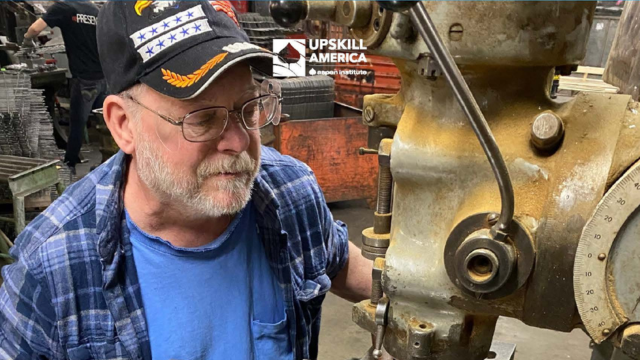Durable Skills, Strong Starts: What Employers Really Want from Early- Career Talent

Haley Glover
Senior Director

Angie Napper Walker
WGU General Education

Sherri Hartzell
WGU General Education
While technical skills, especially AI-specific capacities, are capturing a lot of headlines right now, durable skills and attitudes, distinctly human skills and attitudes, have always been in high demand, appearing on annual top skills lists produced by LinkedIn, World Economic Forum, and other leading organizations. From communication to adaptability, resilience to teamwork, employers and educators alike acknowledge the importance of these durable skills and attitudes to success in early-career roles. For all the attention, though, there is often a lack of clarity about what these skills and attitudes are, how they’re developed, and how they are evaluated in real hiring decisions, especially for early-career roles that require little work experience.
The result is a landscape with many lists but little context. One employer might emphasize critical thinking, another collaboration, while others speak vaguely of “fit.” Education providers, meanwhile, grapple with how to teach and measure skills and attitudes that are deeply contextual and often personal. With millions of new graduates and early-career workers entering an increasingly complex and disrupted labor market, the stakes are high for employers looking to build strong teams and for education institutions trying to prepare students for success in their first roles.
This study offers a fresh perspective, going beyond identifying which durable skills and attitudes are “in demand.” In early summer 2025, with support from Western Governors University, UpSkill America had the opportunity to dig deeper into durable skills and attitudes to gain a better understanding of how US employers valued and prioritized these capacities in their early-career hires. For the purposes of our research, we use the following definitions:
- Durable skills – are enduring skills that are not job/role specific but are valued across all roles and workplaces (teamwork/collaboration, active listening, communication, etc.)
- For a list of durable skills and their definitions, please see Appendix A.
- Attitudes – are the mindsets, personality traits, and philosophies that may be applied on the job.
- For a list of attitudes and their definitions, please see Appendix B.
Using a web-based survey, we secured over 550 responses from employers across the country, representing all 50 states and every sector, industry, and organization size. We surveyed employers to understand:
- Which durable skills and attitudes they believed were most important for early-career roles,defined as entry-level positions requiring 0-3 years of experience in a field.
- How employers prioritize skills and attitudes differently based on their industries, sizes, and talent philosophies.
In our survey, we asked employers to indicate how important each durable skill and attitude is to their evaluation of early-career candidates on a 5-point scale. We also asked employers how they use and prioritize durable skills and attitudes in hiring decisions and how they believe these skills and attitudes are most effectively developed
Our findings offer interesting perspectives and point to new opportunities for collaboration between higher education and industry. Among them:
- Employers in our survey were split between hiring primarily for skills required by the role (58%) and hiring for attitudes (42%). Those that have removed degree requirements tend to fall into the latter group. Yet across approaches, most employers value similar core skills and attitudes.
- Employers appear to think about skills and attitudes in clusters rather than as isolated attributes. We found consistent patterns between skills and attitudes that are prioritized together, suggesting some interesting opportunities for education providers to develop more comprehensive learning experiences. Skills associated with being ready to execute on day one of work were the most highly valued by the majority of employers in our study. We call this set of attributes the “Execution and Reliability” core.
- Most employers believe these attributes are developed through experience rather than through coursework. 85% of employers say durable skills are developed through life and work experience, not formal instruction. This perception calls for continued evaluation of how colleges and universities prepare students, and how employers must take some responsibility for creating immersive, real-world learning experiences for those entering the workforce.
This study reveals how employers evaluate early-career talent in practice and highlights some gaps between what they seek and what new early-career employees arrive with on day one? To unpack these insights, we will begin by laying out what employers told us they expect and value in their entry-level hires? We will then define the individual and clustered skills and attitudes that appear to be most and least important for employers? We discuss the differences and similarities we see across industries and organizations of different sizes? Finally, we conclude with discussion of the implications of these findings for educators and employers seeking to nurture talent development?
This piece is the first in a series. We will release additional briefs over the coming months that dive deeper into findings.
UpSkill America, an initiative of the Aspen Institute’s Economic Opportunities Program, conducted the qualitative study on behalf of Western Governors University. The report describes what employers said they need to make better use of these Learning and Employment Records and makes recommendations for credential providers.
About Western Governors University
Western Governors University, the nation’s leading nonprofit, online university, is transforming higher education to be more student-centric, affordable, accessible to all and relevant to the workforce. Established in 1997 by 19 visionary US governors, WGU creates life-changing pathways to opportunity for those underserved by traditional institutions — working adults, historically underrepresented communities and a diverse, growing number of learners looking for a flexible, online model that better suits their life circumstances. WGU’s competency-based education model allows students to demonstrate mastery as they progress through programs at their own pace. Accredited by the Northwest Commission on Colleges and Universities, WGU operates in all 50 states and offers more than 112 degrees in health, education, technology, and business. Additionally, WGU provide individual courses and certificates for students preparing to pursue a degree. WGU serves more than 193,000 students nationwide, with more than 401,849 alumni, and has awarded more than 453,438 degrees. Learn more at wgu.edu. Follow WGU on X at @wgu and on LinkedIn.
About UpSkill America
UpSkill America, an initiative of the Economic Opportunities Program, supports employers and workforce organizations to expand and improve high-quality educational and career advancement opportunities for America’s front-line workers.
About the Economic Opportunities Program
The Aspen Institute Economic Opportunities Program advances strategies, policies, and ideas to help low- and moderate-income people thrive in a changing economy.
Join Our Mailing List
To receive occasional emails about our work — including new publications, commentary, events, fellowships, and more — join our mailing list.
Connect on Social Media
For news and updates every day, connect with us on the social media platform of your choice.






